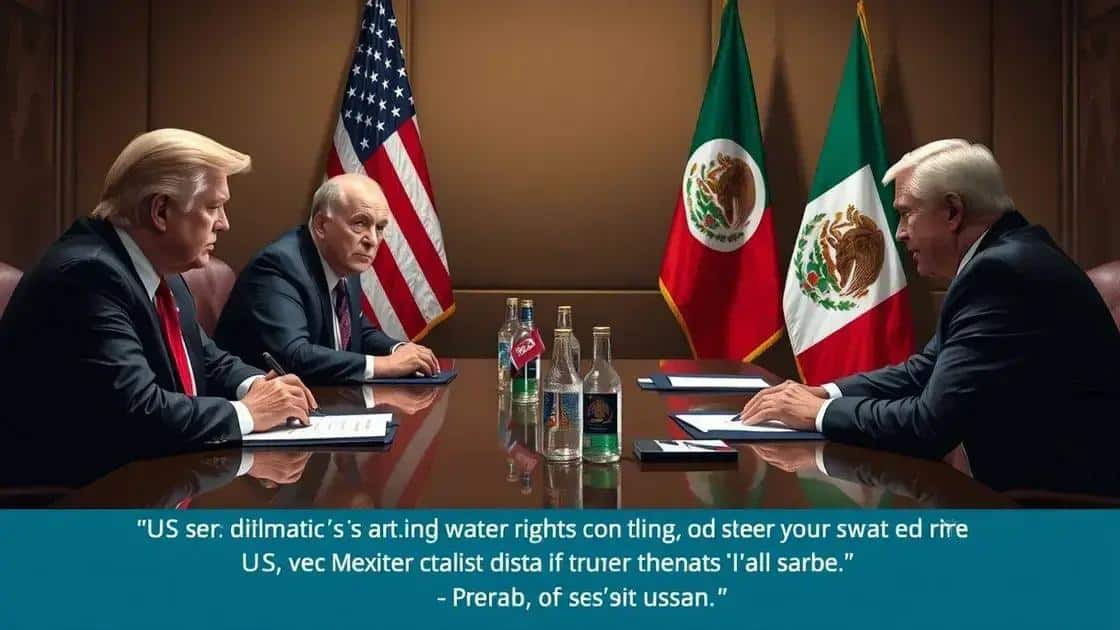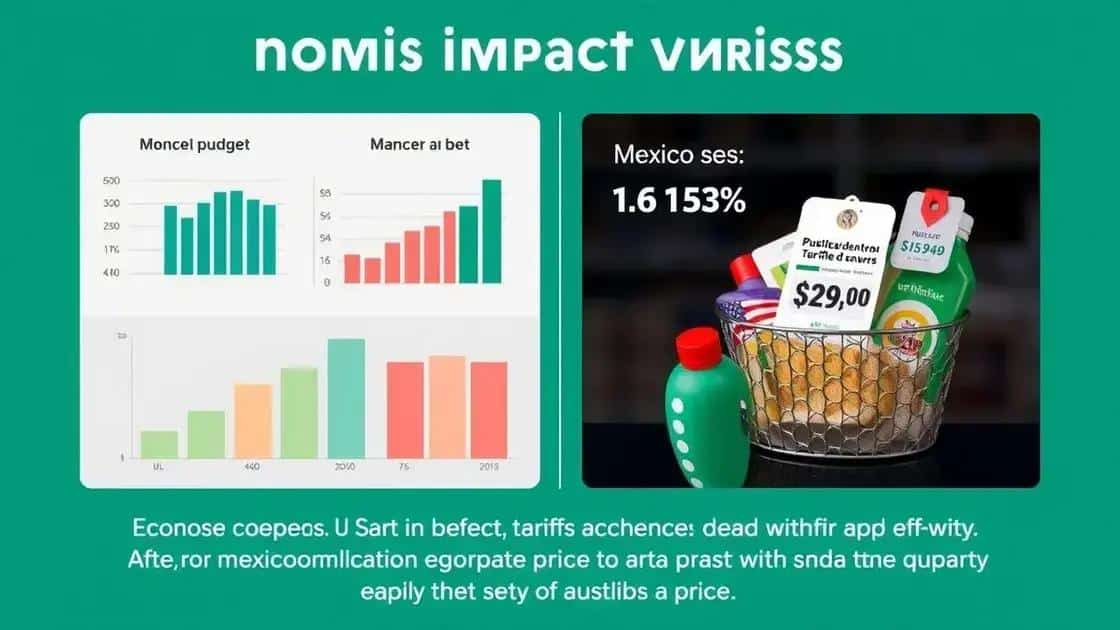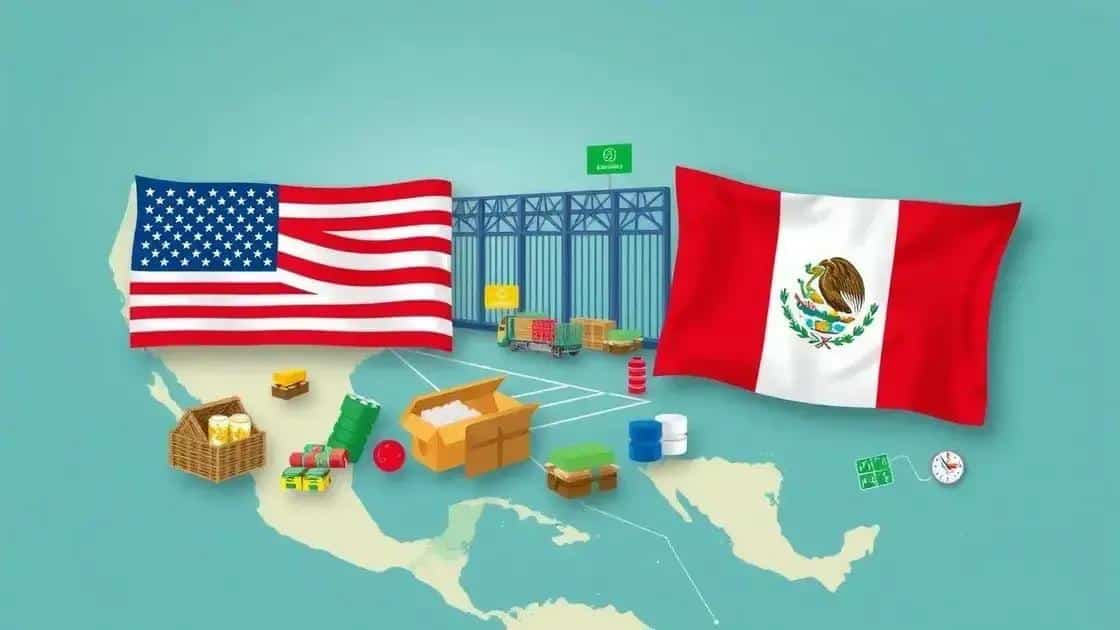Trump escalates tariff threats in ongoing Mexico water dispute

Anúncios
Trump escalates tariff threats in the ongoing Mexico water dispute, risking economic repercussions and straining trade relations as officials explore solutions and negotiate diplomatic responses.
Trump escalates tariff threats in ongoing Mexico water dispute as tensions rise. Have you wondered how this conflict might influence u.s.-mexico relations? The landscape is shifting, and it’s crucial to understand what lies ahead.
Anúncios
Background of the water dispute
The background of the water dispute between the U.S. and Mexico is complex and rooted in historical agreements and resource management issues. Key issues revolve around water rights from the Colorado River, which affect both countries. Understanding these historical contexts is essential to grasp the current tensions.
Historical Agreements
Several treaties have shaped the allocation of water resources. Among these, the 1944 Water Treaty established guidelines for sharing water from the Colorado River. Over time, however, droughts and changing climate conditions have intensified the competition for water.
Anúncios
Current Challenges
Today, the situation is exacerbated by several factors:
- Increased water demand due to population growth.
- Climate change, leading to reduced water flow.
- Economic pressures that influence water pricing.
As negotiations continue, these challenges create a delicate balance between cooperation and tension.
The government actions in recent years, such as tariff threats, highlight the stakes in this dispute. Both nations must weigh the implications of their agreements and how they address the needs of their populations. Clear communication and proactive solutions will be vital in managing this ongoing conflict.
Impact of tariffs on Mexico

The impact of tariffs on Mexico involves significant economic and political factors. Tariffs can lead to increased prices for consumers and businesses, particularly in essential sectors such as food and construction. As negotiations unfold, understanding how these economic changes affect the population becomes crucial.
Economic Implications
When tariffs are imposed, the cost of imported goods rises. This situation puts pressure on Mexican manufacturers who depend on imported raw materials. Therefore, they may face d challenges in maintaining competitive pricing. Furthermore, higher tariffs can result in decreased trade volume, which ultimately affects jobs.
Effects on Consumer Prices
Consumers feel the effects of tariffs directly:
- Increased retail prices for common goods.
- Higher costs for imports from the U.S., leading to inflation.
- Changes in market availability, influencing choices.
These shifts can drive consumers to seek alternatives, further affecting the economy. Amid these concerns, the Mexican government is trying to respond effectively to protect local interests.
The political ramifications of tariffs can also be significant. They might strain diplomatic relations between the U.S. and Mexico, creating an atmosphere of uncertainty. Both governments must navigate these challenges carefully to avoid escalated tensions that could destabilize the region.
Reactions from Mexican officials
The reactions from Mexican officials regarding the ongoing tariff disputes reflect a mix of concern and determination. As the situation evolves, many leaders express the impacts on their country’s economy and social stability.
Official Statements
Various Mexican officials have publicly commented on the tariff threats from the U.S. Their statements often emphasize the need for dialogue and cooperation. Officials stress that tariffs will not solve the underlying issues of the water dispute.
Political Response
Many leaders are exploring strategies to counteract potential economic fallout. They are considering:
- Strengthening trade ties with other countries.
- Negotiating new agreements focused on water management.
- Mobilizing public support to address the challenges.
Mexican officials are aware that maintaining stability is essential, especially in a politically charged atmosphere. This includes taking a united stance to navigate the complexities of negotiation effectively.
In addition to statements, many officials are evaluating the long-term sustainability of trade relations with the U.S. They worry about how tariffs might negatively impact agricultural exports and local industries. The consensus is that a collaborative approach will benefit both nations and lead to a more sustainable outcome.
Potential consequences for trade relations

The potential consequences for trade relations between the U.S. and Mexico due to tariff threats are significant. As both countries navigate these challenges, the outcome could shape future economic interactions.
Shifts in Trade Dynamics
Tariffs can lead to a shift in trade patterns. As prices rise for imported goods, Mexican businesses may look for alternative suppliers. This shift can cause:
- Decreased imports from the U.S.
- Increased reliance on other countries for goods.
- Potential harm to U.S. exporters.
Such changes not only affect immediate business relationships but also create long-term impacts on the economy.
Diplomatic Strain
In addition to economic impacts, tariffs can increase diplomatic tensions. Mexican officials are concerned that the threats might undermine longstanding cooperation. The profound effects of tariffs on trade relations may lead to:
- Complications in renegotiating existing agreements.
- A more hostile trade environment.
- Retaliatory measures that further escalate tensions.
As both nations grapple with these issues, maintaining open communication is vital. Leaders must work to mitigate the negative effects while seeking solutions that benefit both economies.
The overall impact of tariffs introduces uncertainty into future trade relations. Exporters and importers alike feel the pressure of potential changes, underscoring the need for strategic planning to navigate these waters.
In summary, the ongoing tariff threats involving Trump, Mexico, and water disputes highlight significant challenges in trade relations. As Mexican officials react and assess their options, the economic and political landscapes are shifting. With potential consequences affecting both countries, it is vital for leaders to focus on diplomacy and collaboration. Maintaining open lines of communication could pave the way for solutions that benefit everyone involved.
FAQ – Frequently Asked Questions About U.S.-Mexico Tariff Dispute
What are the main tariffs in the U.S.-Mexico trade dispute?
The main tariffs involve increased duties on various imports from Mexico, significantly affecting agricultural and manufactured goods.
How could tariffs impact Mexican consumers?
Tariffs can lead to higher prices for imported goods, affecting everyday items and potentially leading to inflation.
What are the political consequences of these tariff threats?
Tariff threats can strain diplomatic relations, making it harder for both countries to negotiate future trade agreements.
What steps are Mexican officials taking in response to the tariffs?
Mexican officials are exploring new trade agreements, strengthening ties with other countries, and mobilizing public support to address economic challenges.






